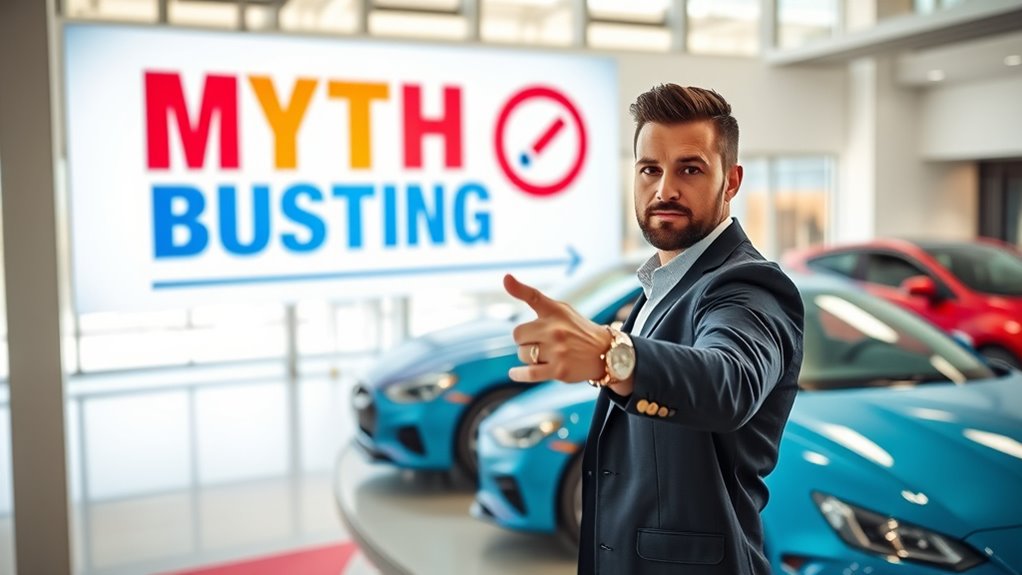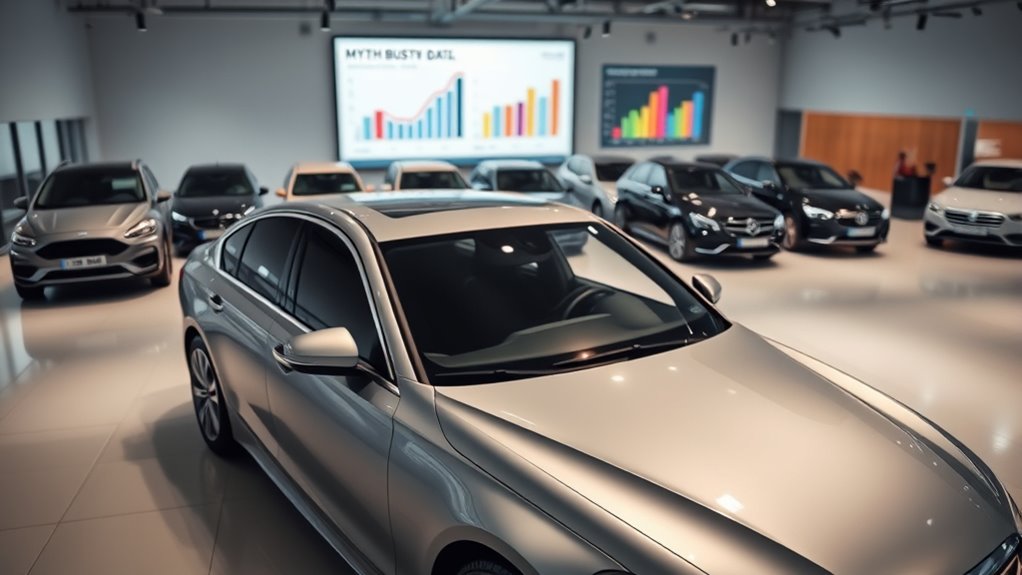Many myths about car leasing can lead you astray, like believing it’s always more expensive or that you can’t end a lease early. In reality, leasing often offers lower monthly payments and flexible options like lease transfers and buyouts. Understanding these facts can save you money and frustration. If you keep exploring, you’ll discover much more about what’s true and what’s not, helping you make smarter choices about leasing your next car.
Key Takeaways
- Many believe leasing has excessively high fees, but proper lease transfer options can mitigate early termination costs.
- Some think leasing means losing all money; in reality, it offers lower monthly payments and access to newer cars.
- The myth that leasing is more expensive long-term ignores that buying builds equity and may be cheaper over years.
- People often assume leasing is only for short-term use, when it can be ideal for those wanting frequent vehicle upgrades.
- There’s a misconception that lease agreements are unfair; understanding lease terms helps avoid hidden charges and negotiate better deals.

Many people believe that leasing a car is always more expensive than buying, but this isn’t necessarily true. When you compare leasing vs buying, the decision depends on your financial situation and driving habits. Leasing often offers lower monthly payments and the chance to drive a new car more frequently, which can make it a cost-effective choice for many. On the other hand, buying allows you to build equity and ultimately own the vehicle outright. The misconception that leasing is always pricier ignores the fact that leases typically come with fewer upfront costs and lower maintenance expenses because you’re driving a newer car under warranty.
Leasing can be cost-effective with lower payments and fewer upfront costs compared to buying.
A common worry about leasing is the idea of lease termination. Many believe that ending a lease early is financially disastrous, but that’s not always the case. While it’s true that terminating a lease before its scheduled end can involve fees or penalties, there are ways to minimize these costs. Some leasing companies allow you to transfer your lease to someone else, which can help you avoid hefty early termination fees. Others offer buyout options, where you can pay off the remaining lease balance and walk away. It’s important to read your lease agreement carefully and understand the terms surrounding lease termination, as this can considerably influence the overall cost if your circumstances change unexpectedly.
People also assume that leasing means you’re constantly paying for something you don’t own. While it’s true that you won’t own the car at the end of the lease unless you choose to buy it, leasing can be a smart financial move if you prefer driving new cars and avoiding long-term maintenance costs. Plus, since lease payments are generally lower, you might be able to afford a higher-quality vehicle or a more recent model than you could with a purchase. When comparing leasing vs buying, consider how long you plan to keep the vehicle and how much you drive annually. If you tend to keep cars for a long time, buying might be more economical in the long run. But if you like switching cars every few years, leasing can be advantageous.
Ultimately, understanding the nuances of leasing vs buying, including aspects like lease termination, helps you make more informed decisions. Don’t let myths cloud your judgment—evaluate your needs and financial situation carefully to determine which option aligns best with your lifestyle. Additionally, knowing that lease terms can vary significantly between providers will help you negotiate better and avoid unexpected costs.
Frequently Asked Questions
Can I Lease a Car With Bad Credit?
Yes, you can lease a car with bad credit, but your options might be limited. Lenders see bad credit as a higher risk, so they may require a larger down payment or charge higher interest rates. Some leasing companies specialize in bad credit leasing options, making it possible to get approved. Be prepared to shop around, compare offers, and work on improving your credit to secure better leasing terms.
Are Lease Payments Higher Than Loan Payments?
Lease payments aren’t necessarily higher than loan payments; it depends on factors like residual value and your lease terms. Think of residual value as the car’s worth at lease end—higher residuals usually mean lower payments. If you need to terminate your lease early, costs can add up, making payments seem steeper. So, compare lease and loan options carefully, and remember, understanding residual value helps you navigate payments confidently.
Do I Need Full Insurance Coverage for a Lease?
Yes, you generally need full insurance coverage for a lease. Insurance requirements vary by lessor, but they usually include extensive and collision coverage to protect their asset. You can explore lease coverage options, which might include gap insurance or additional protection plans. make sure to review your lease agreement and discuss insurance options with your provider to guarantee you meet all lease coverage requirements and avoid potential penalties.
Can I Buy the Car at the End of the Lease?
Did you know that about 45% of lessees choose to buy their vehicle at lease end? Yes, you can buy the car at the end of your lease through the purchase process. Your lease end options typically include buying, returning, or trading in the vehicle. If you decide to purchase, you’ll pay the residual value, and the process is straightforward—just contact your leasing company to start the purchase.
Are Lease Deals Available for All Vehicle Types?
Yes, lease deals are available for all vehicle types, including electric vehicles and luxury cars. You can find leasing options for eco-friendly electric models, which often come with special incentives, as well as high-end luxury cars for a more premium experience. Your choices depend on the leasing company and current promotions, so explore different offers to find the best deal tailored to your preferences and driving needs.
Conclusion
Now that you’ve seen through the smoke and mirrors, go ahead—lease that shiny new car without fear. Forget the myths; they’re just fancy stories designed to keep you confused and paying more. Imagine yourself cruising confidently, knowing you’re smarter than the rumors. After all, who needs fairy tales when you’ve got the truth? So, get out there, sign on the dotted line, and enjoy the ride—myth-free and worry-free!










